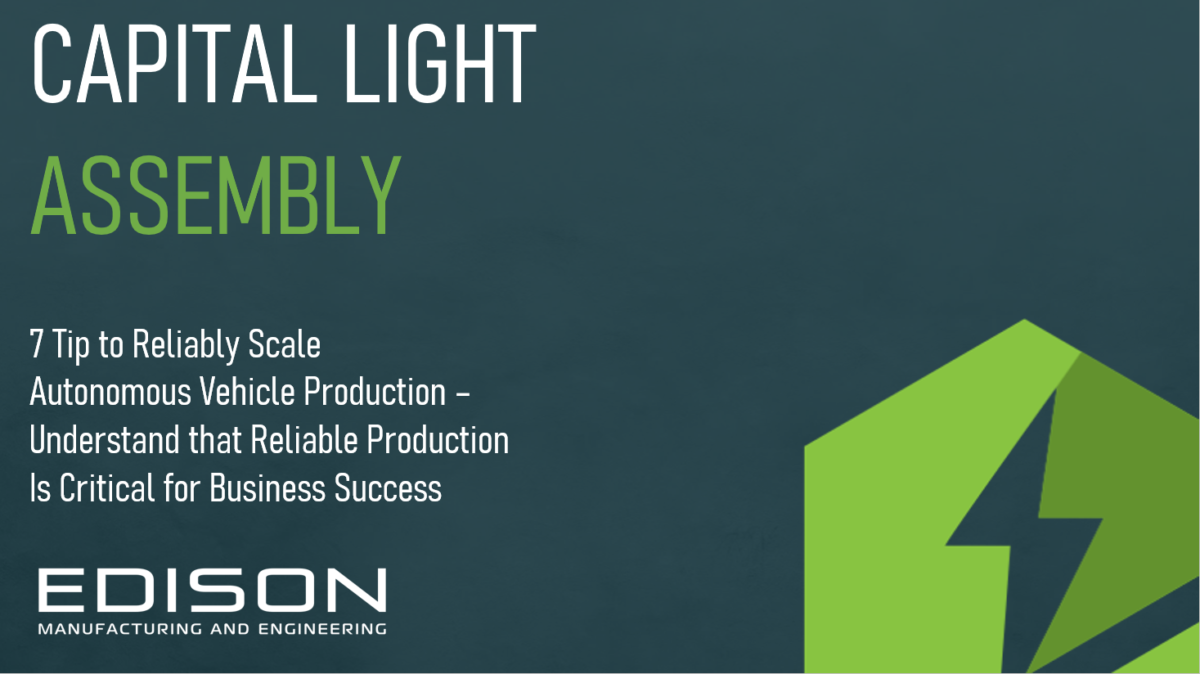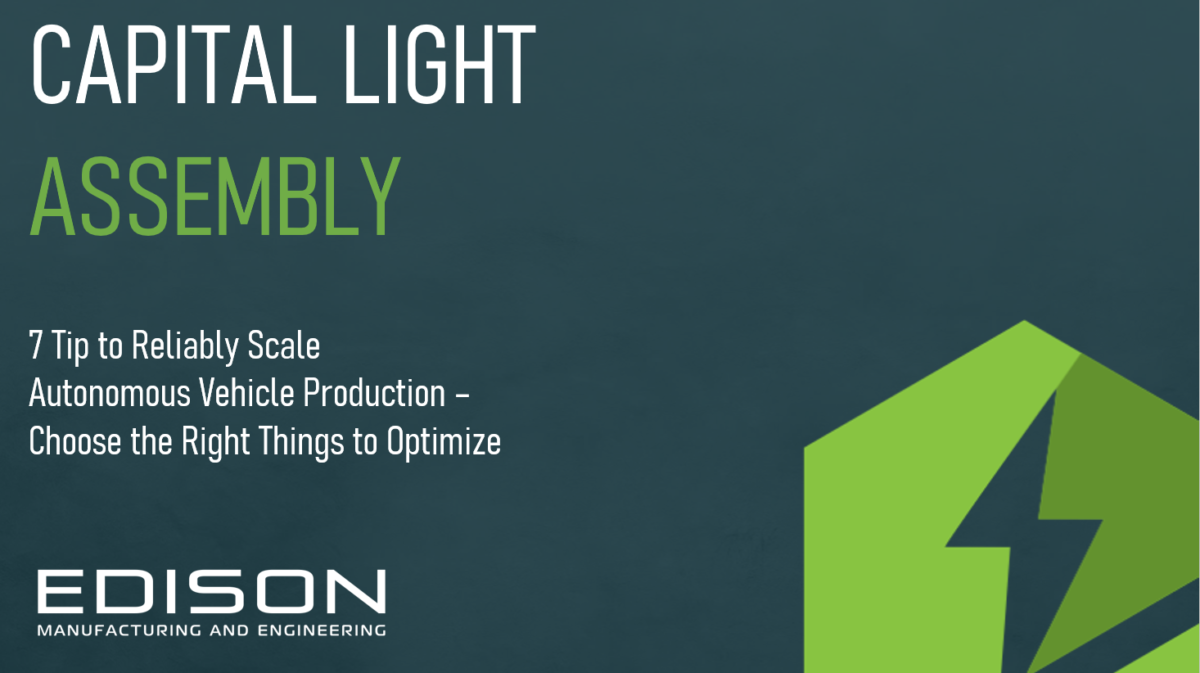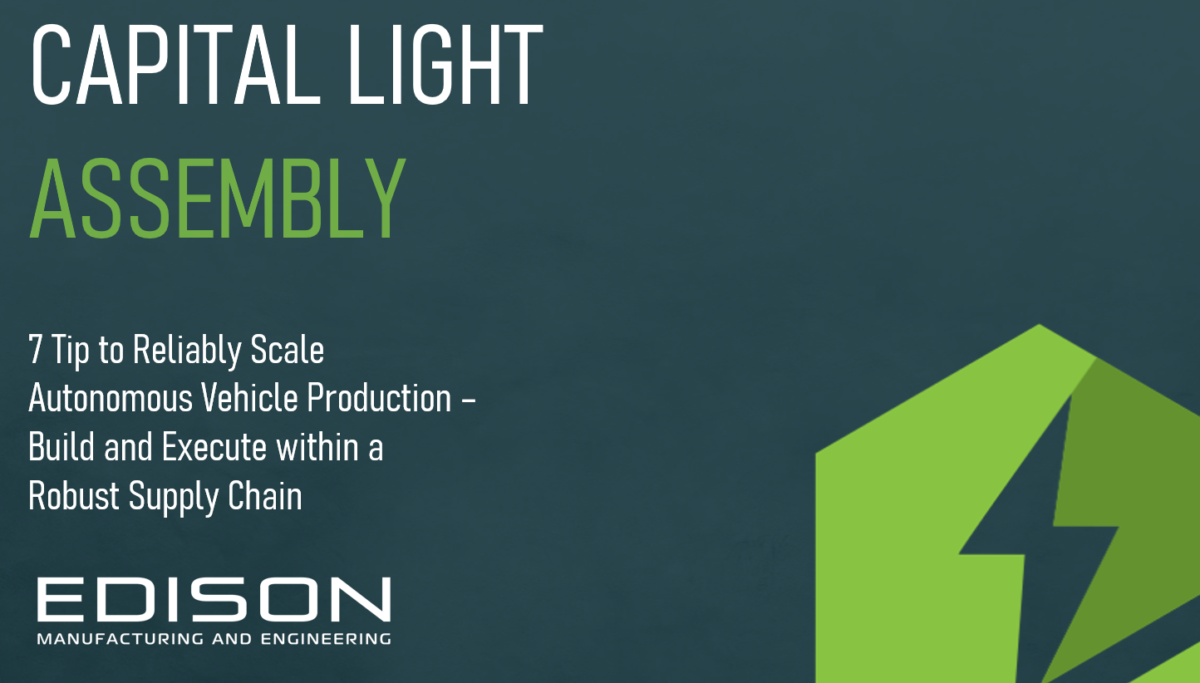In this conversation, we will be joined by Tracey Fletcher, who holds the position of Chief People Officer at Wallbank Industrial. This role encompasses overseeing both Edison and our sister company, PJ Wallbank Springs. Tracey will be speaking with us about the significance of cultivating a strong organizational culture, particularly in a customer-centric business such as Edison. She will shed light on the foundational principles that we have put in place to shape and reinforce our culture, which is key to our success as a company.
Key Takeaways:
- We cannot offer unparalleled products and services or be a remarkable manufacturing ally without placing our team members first.
- We measure success based on decades and years, not just at the moment, what looks best.
- We won't compromise our values to achieve success because it doesn't ring true to who we are or what our people expect.
Full Transcript:
Brandon: Welcome to the Capital Light Assembly podcast brought to you by Edison Manufacturing and Engineering. Edison is your low volume contract manufacturing partner focused on capital-light assembly of complex mobility and energy products that don't neatly fit within traditional high-volume production. I'm Brandon Bartneck, joined today by Tracey Fletcher, chief people officer at Wallbank Industrial, which includes Edison, as well as our sister company PJ Wallbank Springs. Tracey, thanks for joining!
Tracey: Thank you for having me! I’m really excited to do this with you today.
Brandon: I think the topic today is one that I'm really passionate about. I'm excited to dive in too. We're talking about culture, and this is something that is noticeably different at Edison. It's hard to put your finger on, but like certainly before I joined and certainly since I joined the organization, I felt that there was something different about the way we do business here. I've also heard feedback from others within the organization but also our customers, and even some in the community people who are working alongside us. There's something here kind of the way we work, and I'm excited to dive into what that looks like. So, with that said, maybe the first foundational question is why culture matters, especially for an organization like Edison Manufacturing. We're coming in; we're doing this complex manufacturing work. Why does our culture matter? How does that somehow influence our ability to serve as an effective partner for our customers?
Tracey: Yeah, so why does culture matter? Maybe it's helpful to zoom out just a little here and start with what's the definition of culture and how we define or think about culture. There's a lot out there in terms of how it might be defined, but I think, you know, largely it's about the attitudes, the collective values, the behaviors that each individual in an organization that they choose to have, and when we think about maybe summing that up a simpler way, it might be to say it's how we do things around here, how things get done, um and when I think about that - it's what guides our daily practices. It's what shapes how we communicate! It's really that North Star for decisions that we make, particularly those tough decisions that inevitably come up in an organization like ours, so maybe with that definition of culture in mind, that is how things get done around here. It’s then easier to answer the question you know to your point of, well, why does it matter in manufacturing organization and what we're trying to achieve, and you know your first thought is often like, well, shouldn't it really be all about the quality processes that we have shouldn't it be about the quality products that we produce um or being focused on what's important to our customers? To me it's kind of a yes, and. Right? So absolutely, those things are a core focus, but they're the output, and there's something that we have to attend to first and foremost, something that comes first, and that's really it's about our people, and so we want to create an environment that's all about creating a standout performance for our customers and being a standout manufacturing partner, but we can't do we can't really do that if we're not attending to our people first. And that's why culture matters or where it comes in. You know, there's a lot of thought around what culture can be measured by - I always come back to this: the worst behavior that you tolerate in the eyes of your people, so that's how people are seeing it. So, they're setting a high bar for what's important in order for them to show up and to really get after it every day and to be in a place where we're unlocking that discretionary effort that makes us the better partner than anyone else out there and that comes through a focus on building a consistently strong and positive culture.
Brandon: Yeah, I think that's a great baseline to start, and then so the next question, right, so you buy, and we buy in, we say, okay, culture is important. It's something that we believe should be core to how we do business - where do you go from there? How do you - what's kind of the foundation on which we have attempted to build our culture?
Tracey: Yeah, so when I think about the foundation for us, so what's important to Edison, there's kind of two pieces to it. It's not only what we'll achieve but also how we'll achieve it, and maybe it makes sense to start first with the what. So, when we think about the foundation for our culture, really, it's about creating an impact. And when we think about that, it's making an enduring impact on, you know, the people's lives, and we have a very ambitious goal to make an impact on more than a billion lives annually. By doing that, we want to create a future that's really, you know, better than it otherwise would be or might not even exist if it weren't for the work that we're doing. So, that's pretty big, it's pretty ambitious, and it has multiple layers to it. To me, it's, you know, it's that end impact on our customers and the people whose lives are impacted by the products that are out there or wouldn't otherwise exist. Things that, you know, are different in the future that we'll be a part of that that didn't exist. You know, at the beginning of your lifetime or mine, and that's really cool, important, impactful work and something we all want to be a part of. There's another piece of that, though, too, which is about having an impact on the community where we are. You mentioned you know you've heard from people in the community about having a strong culture, how important that is, and how we might do that differently. It's, I think, maybe most important when we think about the impact to consider and what that means to the individuals inside of our organization, inside our four walls, we're impacting their lives every day by the opportunities that we create. by giving them a chance to be part of something that's bigger than themselves, that they're able to show up and engage in, and really, you know, put their thumbprints on. That's the part that unlocks that effort that we're after. So, when I think about it, that's a big piece of it. Probably one other thing around what we'll achieve that's important, or maybe sets us apart, and that's the time horizon that we think about when we think about making an impact, you know, a lot of organizations, especially like ours, where we're just we're growing we're starting out, we're experiencing some of our first kinds of different successes, and it's very natural to think in short term, but that's not how we impact a billion lives. We have to have a long-term focus. We've got to maintain a long-term focus, and so that's a real foundation of our culture as well. We're going to measure our success not just in the here and now, but metrics matter, KPIs matter, uh, we look at every week, but we're not just going to measure our success in those days, those weeks, those moments uh those months but really in decades. So, I think that that's a big piece of, uh, what it is we're trying to achieve, and the second part, um, is how we do it. So how do we bring that to life? How do we make that happen? That's really through our values. Lots of organizations have core values. In our organization, we have four: they treat others as you'd like to be treated; the Golden Rule, they take ownership, challenging the status quo; and then also the mindset around either winning or learning in the work that we do. They're simple, right? I mean, those are pretty straightforward, but I think what makes them important, and what makes them matter to who we are and what we do, is really how we operationalize those values. Not long ago, I stumbled on some research that blew me away, but it stuck with me, and that was less than one percent of organizations who talk about core values actually operationalize them. So, that's kind of where the magic is. It's the work that you do to embed your values and your systems processes, and you know the impact that you're going to have.
Brandon: So, I have two things to put out there. So, one, I hadn't heard so clearly until I joined the organization, so coming up on a year ago now, kind of this - the various levels of impact, right? So, it's easy to look at, especially, I mean, we're working on some of the coolest technology out there, as well as some of, I don't know, some of the legacy type technology, but cool things that I mean it's pretty easy to look at and say well this is something that's going to go into someone's vehicle or is going to have some impact of whether it's cost or safety or performance or whatever but building on that of the impact on yes the End customer but then also the individuals that we're working with on the customer plus the people in our community plus maybe more important than anything the people within the four walls of our organization and the ability for us to build something that has a positive impact through them and then kind of there's this outward spread of impact that is interesting. So I think that was one thing that really stuck with me, and then the second one, which I think was where you were going of - okay how do you go from it's great to have these high-level highfalutin goals right of let's go make a big impact let's set you know certain number of lives you're going to impact we're going to have a huge impact, on the people around us but how do you actually turn that into practice? And that was one of the things I was skeptical of a year ago, no longer skeptical, but like coming in right of like, okay, how do you? How are these not just words on a piece of paper on the wall how do you actually put these into practice? Can you speak to that?
Tracey: Yeah, I think it's through a lot of intentional work and in how we think about making that impact through the systems that we have today. So, it doesn't happen without design for it to happen. This is a good way of saying it. So, there's really maybe we've, as we've thought about it, just a core few functions where we've really been intentional, and they're things that we all touch, about how we embed our values in those core functions. It's recruitment, it's leadership, and, more specifically, how we think about the development of our leaders and how that unfolds, um, through our business. It's decision-making and maybe the communication around how those decisions are made or why we're going in the direction that we're going. And then the fourth piece is really about what we reward and what we recognize as a business, and you know, there's, so there's a lot there. There is a core few, but certainly, a lot there that is really important for us to consider. And so, maybe, it's helpful, I don't know, Brandon, to give maybe one example of how that happens and maybe bring that to life?
Brandon: Yeah, that'd be great. Go for it.
Tracey: Cool, so maybe recruitment is a good example for us to start with - the first on the list. So we've done a lot of work to think about our core values and how they show up in our recruitment processes, and, you know when I think about the business at Edison, or really across the board for our company's manufacturing engineering, is that's a function, that's a role that's really critical to our success. It can also be pretty competitive to find the right talent to get in the door, and, you know, we could, we could have on paper someone with exceptional accomplishments, someone who's top in their field, and if we get in a room with that individual and we start to dig into who they are and how they've achieved those results, and if their how is at all outside of our values -we're done. It's game over. We won't compromise our values to achieve success because it doesn't ring true to who we are or what our people expect. You know, another way that we can think about measuring culture, and I think this is important, in this example, is, and I read this recently somewhere, where culture can be measured by how you feel in the pit of your stomach on a Sunday night. You know, do you feel that sense of dread? Do you feel anxiety anxious? Or are you excited and anticipating what's going on in the week ahead? So if we make a decision, and again, this is the short-term long-term thing, if we make a decision to bring someone on board who is going to operate in a way that's outside of our values, think about all the other people around them in the business who have that dread and that sense of anxiety of having to work alongside someone who's outside of the values that that they bring to the work that we do. So, it means that we don't compromise on those things, and I think that that's something that we all hold true. It's not easy, especially when you know we've got big goals and lots of things that we're working toward, but it's really important. So, that's one example of a system that we've embedded, or operationalized, our values as part of it and how it has a real impact on the business that we do.
Brandon: yeah, thanks, and I think this has been a great kind of teaser, a great intro to how we've thought about culture, and I think there's a lot more to unpack here, and I'm looking forward to future episodes of this podcast getting more into detail on recruitment, leadership, as well as the other topics that you mentioned here of, recognition, and what was the last one that I'm missing?
Tracey: Recruitment and leadership development and decision-making communications.
Brandon: Yeah! Yeah, so yeah, I'm looking forward to unpacking each of those in future discussions. I mean, one of the things that are interesting, like even this recruiting, so this example you gave us, is powerful, but even that, there are a few layers to get deeper here of - okay, how do you actually do that, and it can't be, but that's really a luxury to be able to make those decisions and to be able to make values driven decisions about, so if we're not putting ourselves in place, from a business perspective, to have enough people who want to work with us and who have the opportunity, like we can't be choosy, beggars can't be choosers, so like, there's work to be done to set yourself up to make that decision, as well as many of the other decisions that go into these other categories. I'm looking forward to exploring that in future discussions. So, um, yeah, Tracey, I really appreciate the time here, and yeah, thanks!
Tracey: Glad to have been part of it! Thanks, Brandon. I look forward to more!



